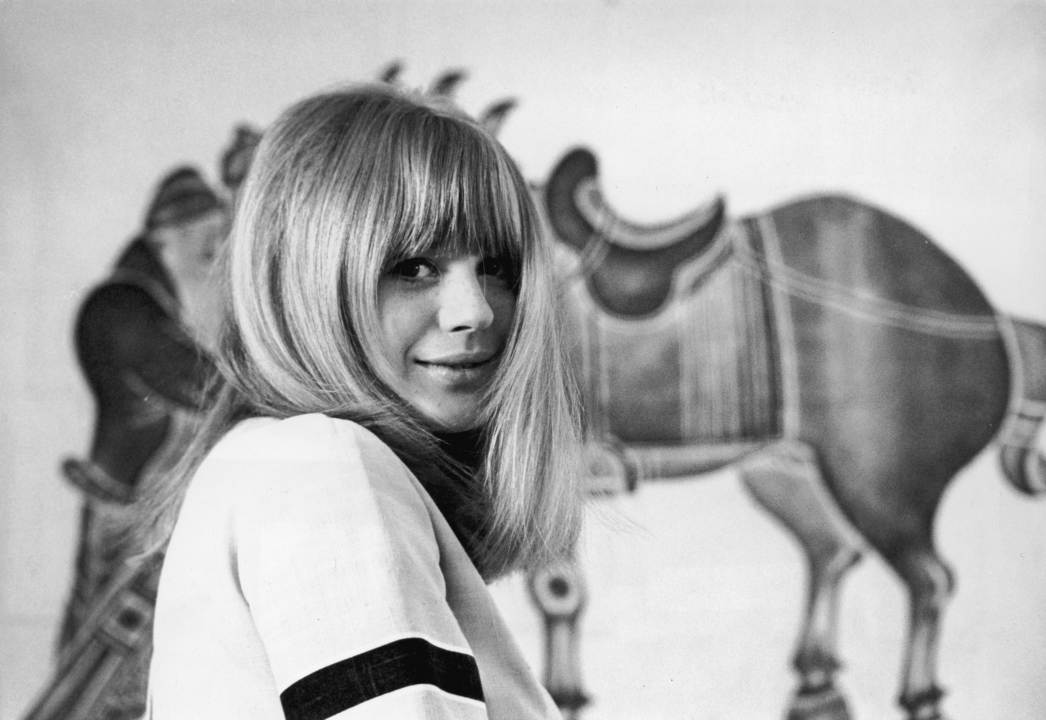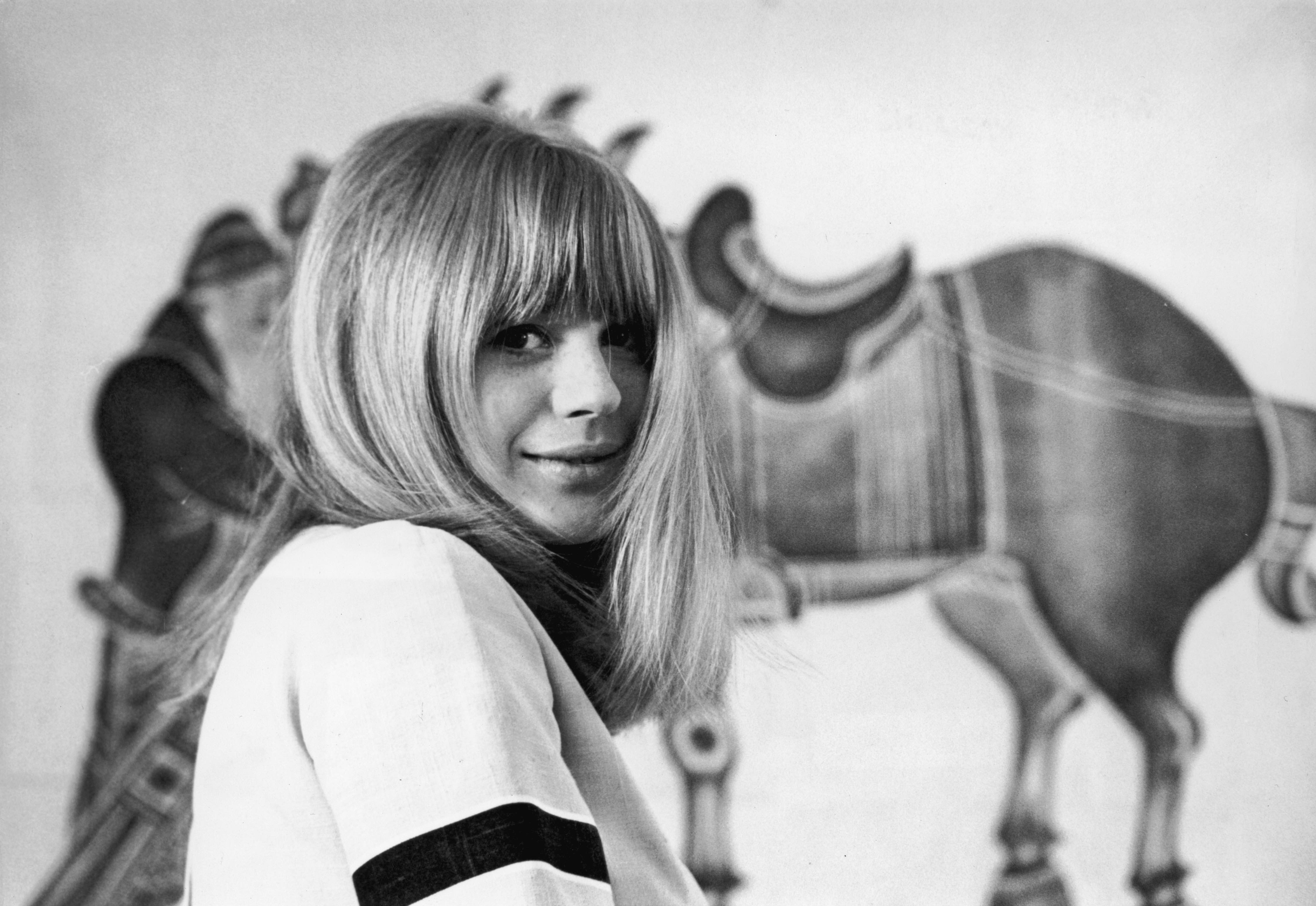Anyone of a certain age is aware of the urban legend that links Marianne Faithfull, a Mars bar and Mick Jagger. But Marianne’s death yesterday at the grand age of 78 (given her lifestyle, how did she get that old?) really does remove one of the last living links with the golden age of rock and roll in its wildest youth.
For Marianne embodied every cliche associated with rock excess: the lover of three of the original five members of the Rolling Stones (Mick, Keith Richards and Brian Jones), she also took on David Bowie, but had the good sense or taste to reject the amorous advances of Bob Dylan and Jimi Hendrix.
After the affair with Mick ended, Marianne had a lost weekend in the 1970s lasting for five years while she was deep in the throes of heroin addiction. Squatting on a wall in Soho that became her ‘home’, the experience was not wholly negative: she said that it taught her the essential goodness of humanity when she was kept alive by being fed by a Chinese restaurant and given free cups of tea from the owner of a vending stall.
Marianne owed much of her resilience and distinction to her fascinating family roots: her mother Eva was a baroness from a long line of Austrian aristocrats, and her father was a British army intelligence officer. (His name was Major Robert Faithfull, so her singular and highly inappropriate surname was not a showbiz pseudonym.) Her mother’s great uncle was the 19th-century writer Leopold von Sacher-Masoch – the man who involuntarily gave his name to ‘masochism’ after his novel Venus in Furs, a hymn to female domination.
Marianne’s parents had met and married in the immediate postwar Vienna of The Third Man. Eva evidently shared her daughter’s fiery spirit: another legend relates that she saved her own mother, Flora, from being raped by a Russian soldier by taking his gun and shooting him dead. Sadly, like many such wartime marriages, her union with Major Faithfull did not survive transplantation to Britain, and after Marianne’s birth in 1946 the couple split and Eva moved to the humdrum surroundings of Reading, where Marianne had a convent school education.
Precociously intelligent and independent, she moved to swinging London while still in her teens, and made the first of her three marriages, giving birth to her only child Nicholas in 1965 when she was 18. When she was still 17, she had met the Stones’ manager, Andrew Loog Oldham, at a party. Never a gentleman, Oldham dubbed the elfin child ‘an angel with big tits’, heard her sing and drew her to the eager attention of the band.
Mick and Keith reworked an old song into the haunting ‘As Tears Go By’, which became her first and greatest hit. Despite giving off a beguiling air of innocence, Marianne eagerly participated in the drugs-soaked milieu of the era, though according to her she never enjoyed that other essential component of those times – sex – until she was well into middle age. Be that as it may, in 1967 came the epochal event that was to bring her into popular consciousness and unjustly define her complex personality into tabloid caricature.
Marianne was a guest at a weekend party at Redlands, the hideaway in West Wittering on the West Sussex coast that Keith Richards had purchased with the first flush of the Stones’ earnings. Naively looking forward to nothing more exciting than tripping on acid, by her later account she was taking a bath or shower when proceedings were interrupted by the noisy arrival of 24 members of the constabulary. (Other much-denied rumours gave a more sticky explanation of Marianne’s naked state when the cops barged in.)
All accounts agree that her modesty was preserved by being hidden under a rug while the police turned the house over in a classic drugs bust. Subsequently Mick and Keith were tried at Chichester Crown Court and very briefly imprisoned until they were rescued thanks to the unlikely intervention of William Rees-Mogg, editor of the Times, who protested at their incarceration in an editorial headlined ‘Who breaks a butterfly on a wheel?’.
It was in Paris in the 1990s that I had my only meeting with her. What struck me most was her extraordinary self-possession and honesty
Marianne’s relationship with Mick and the other Stones was permanently damaged by the publicity over the event and she rightly drew attention to the double standards surrounding the affair – with the band being hailed as free-wheeling heroes of liberation while she was branded an immoral slut.
Soon after the break-up with Mick, Marianne descended into a heroin-addled hell that she was lucky to survive. She emerged to relaunch her singing career with a much-eulogised album of country influenced songs, though one cynical rock critic opined that her voice had changed from that of ‘an angel to a cranky old crone’. In 1979 she released another signature song, ‘The Ballad of Lucy Jordan’, in which she referenced her newly adopted home city of Paris.
Parallel to her singing career, Marianne had enjoyed success as a stage and screen actress, with roles ranging from Rebecca in The Girl on a Motorcycle with Alain Delon to the mad Ophelia in Hamlet. It was in Paris in the 1990s that I had my only meeting with her. I was trying to establish the truth about the mysterious death of another wild child of rock – Jim Morrison, lead singer of the Doors, who had died in the city in 1971, reportedly of a heroin overdose. Hearing rumours that Marianne had been in Paris at the same time and knew more than most about Jim’s demise, I tracked her down to a cafe on the left bank, where she agreed to be interviewed.
The actual interview was unrewarding. She only told me what was already common knowledge – that Morrison, unused to handling heroin, had overdosed and died in the toilet of a club and that those who had supplied the drug had then bundled his body back to his apartment where he had more decorously ‘died’ in his bath all over again of heart failure. But what struck me most about the encounter was Marianne’s extraordinary self-possession and honesty. An Austrian resident at the time myself, I was as much interested in her ancestry as in her own life and times. She said that she had renounced all drugs in the mid-1980s, and spoke warmly of a fellow Paris resident – Jarvis Cocker of Pulp – with whom she was cooperating on a musical project.
I was glad to read the deservedly warm tributes paid to her after her death by her former beaux Mick and Keith, and delighted that she had reconciled with her father after their long separation and lived long enough to enjoy family life with her grandchildren. She survived a three-week hospitalisation with Covid during the pandemic, as well as breast cancer and crippling arthritis. A fallen angel she may have been, but she was an angel nevertheless.








Comments